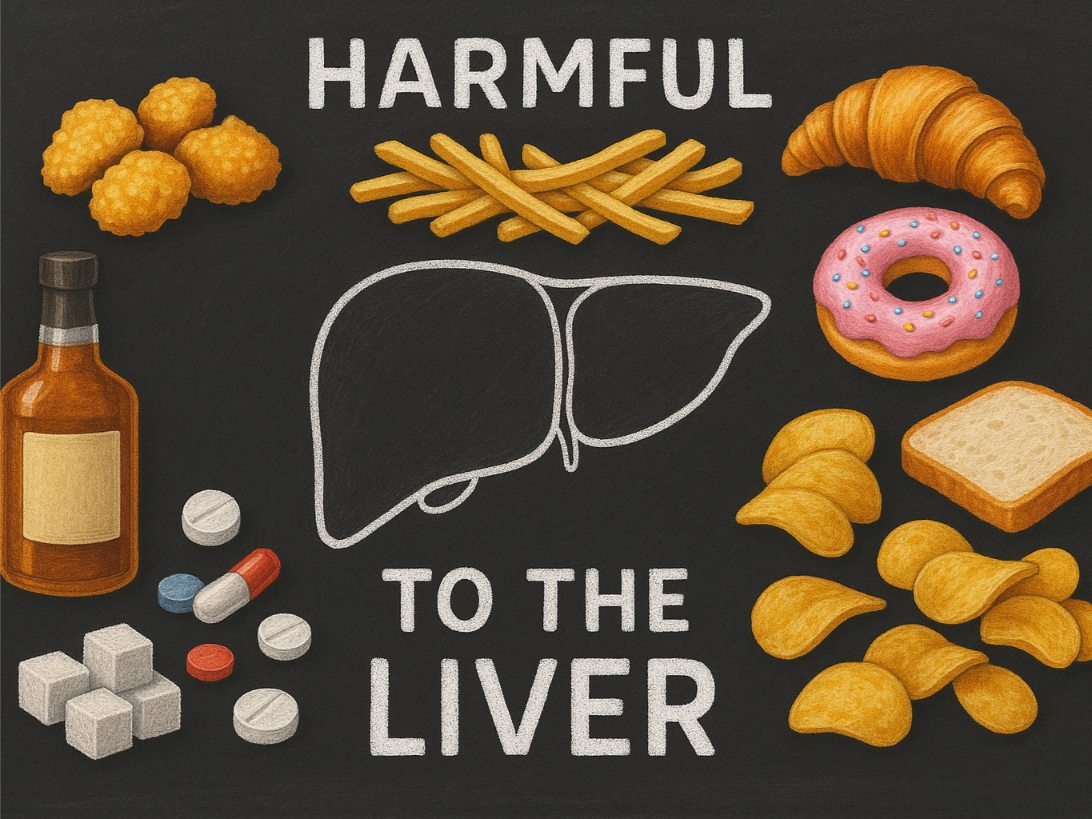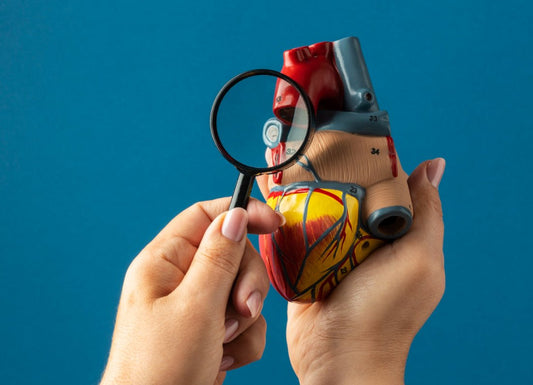What Are the Three Worst Things for Your Liver?
 Written By
Abel Tamirat, MD
Written By
Abel Tamirat, MD

The liver is one of the hardest working organs in the body. It processes nutrients from food, breaks down medications, filters toxins from the blood, and helps fight infections. Because it performs so many vital jobs, protecting your liver is essential for long-term health.
Still, many everyday habits place strain on the liver. Some choices, especially if repeated over time, can increase the risk of serious conditions such as fatty liver disease, cirrhosis, and liver cancer. Among all possible risks, three stand out as the most harmful: excess alcohol, poor diet and obesity, and harmful medications or toxins.
The Three Biggest Threats

1. Alcohol
Alcohol is one of the leading causes of liver damage worldwide. When alcohol is processed, it produces byproducts that can injure liver cells. Repeated overuse leads to fatty deposits, inflammation, and scarring.
-
Early stage: Fatty liver develops when fat accumulates in the cells.
-
Progression: Alcoholic hepatitis causes inflammation, often with abdominal pain, nausea, and jaundice.
-
Advanced stage: Cirrhosis represents permanent scarring, which interferes with normal function and raises the risk of liver failure or cancer.
Even moderate drinking over time can be risky. While guidelines suggest one drink per day for women and two for men, the safest option for liver health is often to drink less — or not at all.
Learn more about your liver health with at-home liver tests and how they can detect early signs of damage.
2. Poor Diet and Obesity
Food choices play a powerful role in liver health. Diets rich in sugary drinks, processed snacks, and refined carbohydrates can cause fat to build up in the liver, even in people who don’t drink alcohol. This is called nonalcoholic fatty liver disease (NAFLD).
Research shows that even people who don’t lose weight can reduce liver fat and improve insulin sensitivity by engaging in regular exercise, especially resistance training. On the other hand, too much sugar — particularly from sweetened beverages and high-fructose corn syrup — accelerates fat accumulation and raises the risk of inflammation and scarring.
Ultra-processed foods, such as fast food and packaged snacks, have also been linked to higher rates of liver disease. Experts often recommend a Mediterranean-style eating pattern, emphasizing vegetables, fruits, lean protein, and whole grains.
3. Harmful Medications and Toxins
The liver filters nearly everything that enters the bloodstream, including medications and supplements. While many are safe when used as directed, some can cause injury.
-
Acetaminophen (Tylenol): Safe in standard doses, but overdosing — especially when combined with alcohol — is the leading cause of acute liver failure in many countries.
-
Certain prescription drugs: Some antibiotics, antifungals, and cholesterol medications may rarely harm the liver.
-
Supplements: Concentrated herbal products like kava, comfrey, or high-dose green tea extract have been linked to liver injury.
Because supplements are not regulated as strictly as medications, the potency and contents may vary. Doctors emphasize the importance of sharing all supplement use with your healthcare provider.
Environmental exposures — such as industrial chemicals or pesticides — can also pose risks, particularly with repeated or high-level contact.
Learn more about liver health in our guide to at-home liver tests.
Other Lifestyle Habits That Affect Liver Health
Beyond the “big three,” experts highlight other behaviors that can strain the liver:
-
Physical inactivity: Regular exercise helps “drain” fat from the liver and improve hormone balance. Both resistance training and aerobic activity have been shown to reduce fatty liver.
-
Skipping coffee: Studies suggest that drinking three or more cups of coffee per day (without excess sugar or cream) may reduce liver stiffness and lower the risk of fatty liver disease. Even decaf appears beneficial.
-
High sugar intake: Excess sugar, especially in sodas and desserts, is strongly linked to fatty liver disease and higher liver cancer risk.
-
Viral hepatitis: Failing to vaccinate for hepatitis A and B, or not testing for hepatitis C, can leave the liver vulnerable to infection.
-
Smoking: Cigarette toxins increase inflammation, worsen scarring, and raise the risk of liver cancer.
Signs Your Liver May Be in Trouble

Liver disease often develops silently. Warning signs can include:
-
Yellowing of the skin or eyes (jaundice)
-
Persistent fatigue
-
Abdominal pain or swelling
-
Nausea or vomiting
-
Dark urine or pale stools
If you experience these symptoms, seek medical advice promptly.
Protecting Your Liver

The good news is that the liver has an impressive capacity to heal if injury is detected early. Steps to protect your liver include:
-
Limiting or avoiding alcohol
-
Maintaining a healthy weight through diet and exercise
-
Choosing whole, unprocessed foods
-
Avoiding unnecessary medications or supplements
-
Getting vaccinated for hepatitis A and B
-
Quitting smoking
For more on protecting your kidneys, check out this complete guide to at-home kidney function tests.
Takeaway
The liver is one of the body’s most hardworking organs, yet it is often overlooked. The three worst things for its health are excess alcohol, unhealthy diet and obesity, and harmful medications or toxins. These factors account for most liver disease worldwide.
Many other lifestyle choices — from smoking to high sugar intake to skipping exercise also contribute to liver strain. The good news is that most causes of liver injury are preventable. By making healthy changes, you can support liver function, reduce your risk of serious disease, and protect your overall well-being for years to come.
Protect your liver early with the Ribbon Checkup At-Home Liver Test.
References
5 Reasons You May Be at Risk for Liver Disease. (2025, August 27). Retrieved September 29, 2025, from Hopkinsmedicine.org website: https://www.hopkinsmedicine.org/health/wellness-and-prevention/5-reasons-you-may-be-at-risk-for-liver-disease
Bashir, A., Hoilat, G. J., Parul Sarwal, & Mehta, D. (2023, July 24). Liver Toxicity. Retrieved September 29, 2025, from Nih.gov website: https://www.ncbi.nlm.nih.gov/books/NBK526106/
Drug-induced liver injury: MedlinePlus Medical Encyclopedia. (2021). Retrieved September 29, 2025, from Medlineplus.gov website: https://medlineplus.gov/ency/article/000226.htm
https://www.facebook.com/WebMD. (2025). Surprising Things That Hurt Your Liver. Retrieved September 29, 2025, from WebMD website: https://www.webmd.com/fatty-liver-disease/ss/slideshow-surprising-liver-damage
Raypole, C. (2019, March 21). Liver Problems and Their Causes. Retrieved September 29, 2025, from Healthline website: https://www.healthline.com/health/liver-diseases

Dr. Abel Tamirat is a licensed General Practitioner and ECFMG-certified international medical graduate with over three years of experience supporting U.S.-based telehealth and primary care practices. As a freelance medical writer and Virtual Clinical Support Specialist, he blends frontline clinical expertise with a passion for health technology and evidence-based content. He is also a contributor to Continuing Medical Education (CME) programs.



